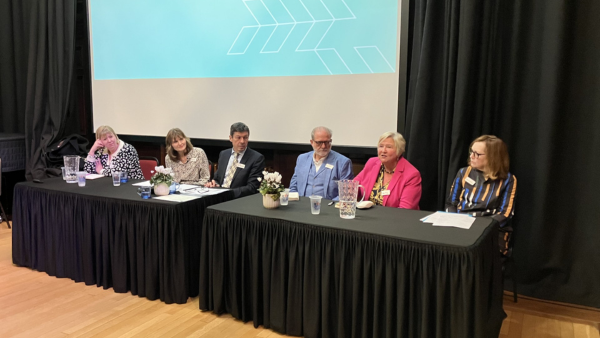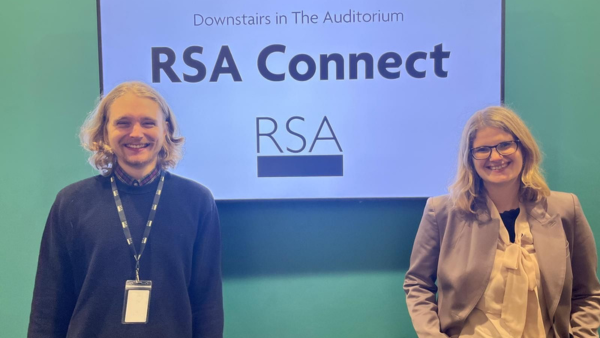In this issue:
We focus on skills for tomorrow.
“Reframing struggles in learning can have a surprising impact on future success”
The pandemic has been a time of lost education for children. It has also been a moment when many have contemplated their skills, occupation and future working lives. In this issue, a wide range of global thinkers and social change practitioners consider what a post-pandemic future for education, learning and the future of work looks like; not least in the context of the need to get to a net-zero carbon emissions economy and beyond.
In this issue of RSA Journal, we explore how a radical reimagining of what we know, and what we think we know, is necessary for the establishment of new education systems and skill sets with which to successfully transition to a post-pandemic, post-carbon future.
Read this issue's articles online:
- In Conversation With Sarah Brown
- Learn, Unlearn, Relearn by Tom Kenyon
- Energy into Action by Mari Nishimura
- Building Connections by Ian McShane, Benjamin Cleveland and Philippa Chandler
- Perils of Perfection by David Robson
- Pandemic Nights by Deirdre Barrett
- Home Safe by Rachel O’Brien
- All for one by Aisha Abdoo Karim
- Collaboration by Daliso Chaponda
- Healing education by Bas van den Berg
- Work shift by Alan Lockey
- Is there a point to homework? by Dacian Dolean
- Working partners by Jamie Cooke
Mari Nishimura of the United Nations Environment Programme draws on her expertise in environmental education and youth issues to elaborate on those skills that will be most necessary and impactful as we make the leap into a greener tomorrow. Read Mari's piece Energy into action.
But this scale of change has never come easy, and RSA programmes do not shy away from exploring these challenges. According to Alan Lockey, head of our Future of Work programme, a key lesson of the pandemic is the need for proactive approaches to reskilling and redeployment, which must change how we learn, train and work. Tom Kenyon, who leads the RSA’s Cities of Learning programme, cautions that, for a radically changing future, we must create a population that is able to learn, unlearn and relearn, rather than simply focusing funding on a specific set of skills.
We also speak to Sarah Brown, Chair of global children’s charity Theirworld, whose work focuses on the needs of children caught up in global crises. She shares some of the innovation and practical solutions that have emerged (such as ‘double-shift’ schools serving children who are displaced), and some of the major challenges we face if we are to equalise access to education and improve not just children’s learning, but also their lifelong wellbeing.
Some of the most progressive thinking surrounding the broader potential of schools is put forward by Ian McShane of Australia’s RMIT University, writing with Philippa Chandler and Benjamin Cleveland of the University of Melbourne, who discuss how the pandemic has emphasised the critical wider role that schools can play in building community and social connectedness. They highlight how, in some locations, new schools are being designed and resourced as integrated community hubs for extended use.
Interrogating the beliefs and systems we take for granted in our culture can yield unexpected revelations. Science writer David Robson discusses how reframing struggles in learning can have a surprising impact on future success. More specifically, Dacian Dolean of Romania’s Babes-Bolyai University shares new research around the impact that homework at the primary level can have when it comes to relationships between school and home and securing children’s foundational skills.
Clearly, access to safe education is dependent on getting the pandemic under control. Aisha Abdool Karim provides an update on global vaccine delivery and what Omicron has revealed about the perils of ignoring our mutual interdependence. Covid-19 does not pay attention to borders and nor – according to Harvard psychologist and dream researcher Deirdre Barrett – do pandemic dreams. She shares some of the evidence on how our dreams have been impacted and what this can tell us about how we respond to collective trauma.
This March, our new Chief Executive Andy Haldane steps into his role full time. Meanwhile, this is my last editorial as I move on from the RSA after almost nine years with a sense of deep gratitude to the staff and Fellows who make the RSA the essential institution it is. We are proud of Andy’s contribution to the crucial work of levelling up and look forward to working with RSA Fellows and with our many partners to help influence a better post-pandemic future.
pdf 6.4 MB

Related articles
-
Facing the future: Scotland's challenges
Fellowship news
Fionna Monk
On 26 November 2024, RSA Scotland discussed Scotland’s future with nine engaging speakers addressing various challenges facing the country. The venue was resonant – a former committee room at the French Institute used in its early days by the Scottish Parliament. This successful event was chaired with deftness and humour by the former Presiding Officer at the Parliament, Rt Hon Ken Macintosh.
-
Improving health through economic development
Report
Anna Markland Liv Chai Nicholas Heslop
The RSA have created an Economies for Healthier Lives Programme Coaching Resource that pulls together our experience, insight and case studies from the five ‘Hubs’. This resource is designed to support those looking to learn from and replicate this work to get supported at every stage, from project inception through to legacy planning.
-
You asked, we listened. RSA Strengthens global and local connections for Fellows
Fellowship news
Line Kristensen Fionna Monk
From our online global community platform Circle to enhanced local co-working spaces and personalised communications, we’re doing all we can to facilitate engagement with the RSA.



